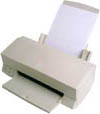The Noncount Noun
Recognize a noncount noun when you find one.
Nouns name people, places, and things. Many nouns have both a singular and a plural form: a surfer/surfers, a restaurant/restaurants, a pickle/pickles. Some nouns, however, have only a singular form; you cannot add a number before or an s to the end of these words. This group of nouns is called noncount.
Read these examples:
After two months of rainstorms, Fred carries his umbrella everywhere in anticipation of more bad weather.
Rainstorms = count noun; weather = noncount noun.
Because Big Toe Joe has ripped all four chairs with his claws, Diane wants to buy new furniture and then find the cat another home.
Chairs = count noun; furniture = noncount noun.
When Professor Russell postponed the date of the research paper, smiles lit up the faces of her students, filling the room with their happiness.
Smiles = count noun; happiness = noncount noun.
Because the beautiful Josephine will help Pablo with his calculus assignments, he never minds the homework from Professor Ribley's class.
Assignments = count noun; homework = noncount noun.
Know the different categories of noncount nouns.
The chart below illustrates the different types of noncount nouns. These categories also include nouns that are count. For example, lightning, a natural event (one of the categories), is noncount, but hurricane, a different natural event, is a count noun.
When you don't know what type of noun you have, consult a dictionary that provides such information.
Category Examples Abstractions advice, courage, enjoyment, fun, help, honesty, information, intelligence, knowledge, patience, etc. Activities chess, homework, housework, music, reading, singing, sleeping, soccer, tennis, work, etc. Food beef, bread, butter, fish, macaroni, meat, popcorn, pork, poultry, toast, etc. Gases air, exhaust, helium, hydrogen, oxygen, nitrogen, pollution, smog, smoke, steam, etc. Groups of Similar Items baggage, clothing, furniture, hardware, luggage, equipment, mail, money, software, vocabulary, etc. Liquids blood, coffee, gasoline, milk, oil, soup, syrup, tea, water, wine, etc. Natural Events electricity, gravity, heat, humidity, moonlight, rain, snow, sunshine, thunder, weather, etc. Materials aluminum, asphalt, chalk, cloth, concrete, cotton, glue, lumber, wood, wool, etc. Particles or Grains corn, dirt, dust, flour, hair, pepper, rice, salt, sugar, wheat, etc.
Know how to indicate number with noncount nouns.
Thunder, a noncount noun, cannot have an s added at the end. You can, however, lie awake in bed counting the number of times that you hear thunder boom during a storm.
When you want to indicate number with a noncount word, you have two options. First, you can put of in front of the noncount word—for example, of thunder—and then attach the resulting prepositional phrase to an appropriate count word.
Kristina heard seven claps of thunder.
A second option is to make the noncount noun an adjective that you place before a count noun. Then you could write a sentence like this:
Thunderheads filled the sky.
Here are more examples:
Noncount Noun Countable Version advice pieces of advice homework homework assignments bread loaves of bread, slices of bread smoke puffs of smoke, plumes of smoke software software applications wine bottles of wine, glasses of wine snow snowstorms, snowflakes, snow drifts cloth bolts of cloth, yards of cloth dirt piles of dirt, truckloads of dirt
Some nouns are both noncount and count.
Sometimes a word that means one thing as a noncount noun has a slightly different meaning if it also has a countable version. Remember, then, that the classifications count and noncount are not absolute.
Time is a good example. When you use this word to mean the unceasing flow of experience that includes past, present, and future, with no distinct beginning or end, then time is a noncount noun.
Read this example:
Time dragged as Simon sat through yet another boring chick flick with his girlfriend Roseanne.
Time = noncount because it has no specific beginning and, for poor Simon, no foreseeable end.
When time refers to a specific experience which starts at a certain moment and ends after a number of countable units (minutes, hours, days, etc.), then the noun is count.
Here is an example:
On his last trip to Disney World, Joe rode Space Mountain twenty-seven times.
Times = count because a ride on Space Mountain is a measurable unit of experience, one that you can clock with a stopwatch.
©1997 - 2025 by Robin
L. Simmons
All Rights Reserved.
